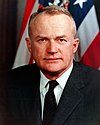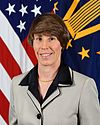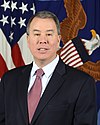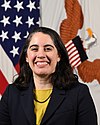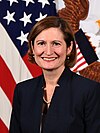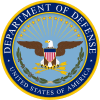Under Secretary of Defense for Policy
| Under Secretary of Defense for Policy | |
|---|---|
 Seal of the Department of Defense | |
 Flag of an Under Secretary of Defense | |
since 27 April 2024 | |
| United States Department of Defense Office of the Secretary of Defense | |
| Style | Madam Under Secretary |
| Reports to | Secretary of Defense Deputy Secretary of Defense |
| Appointer | The President with Senate advice and consent |
| Term length | No fixed term |
| Formation | 1978 |
| First holder | Stanley Rogers Resor |
| Succession | 5th in SecDef succession |
| Deputy | Principal Deputy Under Secretary of Defense for Policy |
| Salary | Executive Schedule, level III |
| Website | policy |
The United States under secretary of defense for policy (USDP) is a high level civilian official in the United States Department of Defense. The under secretary of defense for policy is the principal staff assistant and adviser to both the secretary of defense and the deputy secretary of defense for all matters concerning the formation of national security and defense policy.
The under secretary is normally appointed from civilian life by the president with the advice and consent of the Senate. The incumbent is acting under secretary Amanda J. Dory, who took office upon the resignation of acting under secretary Sasha Baker.
Overview
[edit]The Office of the Under Secretary of Defense for Policy is the principal staff element of the secretary of defense in the exercise of policy development, planning, resource management, fiscal, and program evaluation responsibilities, the rank of Under Secretary, the USD(P) is a Level III position within the Executive Schedule.
Reporting officials
[edit]Officials reporting to the USD(P) include:
- Principal deputy under secretary of defense for policy
Strategy, Plans, & Capabilities
[edit]The assistant secretary of defense for strategy, plans, and capabilities (ASD(SPC)) is responsible for national security and defense strategy, leading the National Defense Strategy, emerging capabilities, security cooperation plans and policies, and force design and development planning.
- The deputy assistant secretary of defense for force development and emerging capabilities provides advice advancing the force development priorities of the Secretary of Defense for implementing the defense strategy, including by devising, facilitating issuance of, and overseeing DoD Component compliance with force planning and programming guidance to balance Joint Force capability, capacity, and readiness for DoD's primary defense missions and emerging security challenges.
- The deputy assistant secretary of defense for global partnerships provides advice on developing policy for security cooperation, humanitarian assistance, and international humanitarian affairs.
- The deputy assistant secretary of defense for plans and posture provides advice on developing and implementing policy, strategic guidance, and oversight of the Department of Defense’s (DoD) operational planning and overseas posture.
- The deputy assistant secretary of defense for strategy provides advice on developing the Department’s national defense strategy and for ensuring that the Department’s program and budget decisions support implementation of the strategy.
International Security Affairs
[edit]The assistant secretary of defense for international security affairs (ASD (ISA)) is responsible for international security strategy, defense policy, and oversight of security cooperation programs and foreign military sales programs relating to Europe, the North Atlantic Treaty Organization, Russia, Eurasia, the Middle East, Africa, and the Western Hemisphere.
- The deputy assistant secretary of defense for African affairs provides advice on international security strategy, defense policy, and oversight of security cooperation programs relating to Sub-Sahara Africa.
- The deputy assistant secretary of defense for the Middle East provides advice on international security strategy, defense policy, and oversight of security cooperation programs relating to the Middle East and North Africa.
- The deputy assistant secretary of defense for Europe and NATO provides advice on international security strategy, defense policy, and oversight of security cooperation programs relating to Europe and NATO.
- The deputy assistant secretary of defense for Russia, Ukraine, and Eurasia provides advice on international security strategy, defense policy, and oversight of security cooperation programs relating to conventional arms control, Russia, Ukraine, Western Balkans, and Eurasian nations.
- The secretary of defense representative in the United States Mission to NATO.
- The secretary of defense representative to the Organization for Security and Co-operation in Europe.
Homeland Defense & Hemispheric Affairs
[edit]The assistant secretary of defense for homeland defense and hemispheric affairs (ASD(HD&HA)) is responsible for the policy, strategy, and implementation guidance for national and global security issues across countering weapons of mass destruction, cyber operations, homeland defense activities, antiterrorism, continuity of government and mission assurance, and defense support to civil authorities. The ASD(HD&HA) is also responsible for the Protected Critical Infrastructure Program (PCII), the Domestic Preparedness Support Initiative, and the Defense Critical Infrastructure Program (DCIP).
- The deputy assistant secretary of defense for countering weapons of mass destruction is responsible for the policy and guidance for chemical, biological, radiological, and nuclear protection, weapons of mass destruction countermeasures, and counterproliferation and non-proliferation.
- The deputy assistant secretary of defense for homeland defense integration and defense support of civil authorities is responsible for the development, coordination, and oversight of the integration and implementation of plans and policy for defense support of civil authorities and civil-military co-operation.
- The deputy assistant secretary of defense for defense continuity and mission assurance is responsible for the development of policies and plans for continuity of government, mission assurance, counterterrorism, emergency management, and critical infrastructure protection.
Special Operations & Low Intensity Conflict
[edit]The assistant secretary of defense for special operations/low-intensity conflict (ASD(SO/LIC)) is responsible for the policy, resources, strategic capabilities and force transformation, and oversight of special operations and low-intensity conflict matters of the United States Department of Defense across counterterrorism, unconventional warfare, direct action, special reconnaissance, foreign internal defense, civil affairs, information and psychological operations, and counterproliferation of weapons of mass destruction.
- The deputy assistant secretary of defense for counternarcotics and global threats is responsible for the policy, resources, strategic capabilities and force transformation, and oversight of special capabilities for counternarcotics and global threats.
- The deputy assistant secretary of defense for stability and humanitarian affairs is responsible for the policy, resources, strategic capabilities and force transformation, and oversight of conflict stabilization activities, peace operations, and humanitarian relief efforts.
- The deputy assistant secretary of defense for special operations and combatting terrorism is responsible for the policy, resources, strategic capabilities and force transformation, and oversight of counterterrorism, counterinsurgency, foreign internal defense, and psychological operations as well as providing staff oversight of the United States Special Operations Command resources, budget, and program development issues.
Indo-Pacific Security Affairs
[edit]The assistant secretary of defense for Indo-Pacific security affairs (ASD(IPSA)) is responsible for international security strategy, defense policy, and oversight of security cooperation programs relating to the Indo-Pacific region.
- The deputy assistant secretary of defense for East Asia provides advice on international security strategy, defense policy, and oversight of security cooperation programs relating to Taiwan, Mongolia, Japan, South Korea, and North Korea.
- The deputy assistant secretary of defense for China provides advice on international security strategy, defense policy, and bilateral security relations relating to China (Including Hong Kong).
- The deputy assistant secretary of defense for South and Southeast Asia provides advice on international security strategy, defense policy, and oversight of security cooperation programs relating to India, Bangladesh, Bhutan, Diego Garcia (in conjunction with ASD(ISA)), Maldives, Nepal, Sri Lanka, Brunei, Burma, Cambodia, East Timor, Indonesia, Laos, Malaysia, Philippines, Singapore, Thailand, Vietnam, Australia, New Zealand, Papua New Guinea, and the Pacific Islands nations.
- The deputy assistant secretary of defense for Afghanistan, Pakistan, and Central Asia provides advice on international security strategy, defense policy, and oversight of security cooperation programs relating to Afghanistan, Pakistan, Kazakhstan, Kyrgyzstan, Tajikistan, Turkmenistan, and Uzbekistan.
Space Policy
[edit]The assistant secretary of defense for space policy (ASD(SP)) is responsible for the overall supervision of DoD policy for space warfighting, encompassing the Department’s strategic capabilities for integrated deterrence: space, nuclear weapons, cyber, missile defense, electromagnetic warfare, and countering weapons of mass destruction. Additionally, this position served as the Principal Cyber Advisor to the Secretary of Defense.
- The deputy assistant secretary of defense for nuclear and cwmd policy provides advice on developing strategies, informing policies, and conducting oversight of nuclear deterrence policy and arms control, as well as developing and overseeing the implementation of strategies and policies of all countering weapons of mass destruction policy issues.
- The deputy assistant secretary of defense for cyber policy provides advice on establishing DoD cyberspace policy and strategy, providing guidance and oversight on DoD cyberspace activities, and managing DoD’s primary external relationships across the U.S. government, key domestic stakeholders, and our allies and partners.
- The deputy assistant secretary of defense for space and missile defense provides advice on space and integrated air and missile defense posture and policies.
- The deputy principal cyber advisor provides advice on military cyber forces and activities and the implementation of the cyber strategy and execution of the cyber posture review.
Defense POW/MIA Accounting Agency
[edit]The director of the Defense POW/MIA Accounting Agency is responsible for the personnel recovery of United States Department of Defense personnel who are listed as prisoners of war (POW) or missing in action (MIA), from all past wars and conflicts around the world.
Defense Security Cooperation Agency
[edit]The director of the Defense Security Cooperation Agency is responsible for providing allies and partner nations with financial and technical assistance, transfer of defense matériel, training, and the promotion of military-to-military contacts.
Defense Technology Security Administration
[edit]The director of the Defense Technology Security Administration is responsible for the formulation and enforcement of technology security policies related to international transfers of defense-related goods, services, and technologies.
Budget
[edit]This section needs to be updated. (November 2017) |
Budget features
[edit]- Defense Critical Infrastructure Program (DCIP): Oversees policy formulation and strategic planning for the Defense Critical Infrastructure Program, to include the Defense Industrial Base, which provides defense-related products and services that are essential to equip; mobilize; deploy and sustain military operations, enabling the Warfighter to minimize risk. Ensures the resiliency of networked infrastructure assets, whether owned or operated by the DoD or private industry, that are critical to executing military missions. Activities include the identification, assessment, monitoring, and risk management of cyber and physical infrastructure assets critical to the execution of the National Military Strategy. DCIP is run under the auspices of the Office of the Assistant Secretary of Defense for Homeland Defense and Americas' Security Affairs, where it is overseen by the DASD, Homeland Defense Strategy and Force Planning.
- Global Threat Management: Provides policy, guidance and oversight on existential threats, supranational threats and non-state actor threats. OUSD(P) fulfills this global mission by crafting and implementing initiatives to expand cultural understanding throughout the world in governed and ungoverned areas to aid in preventing the expansion of terrorist cells. Utilizes table top exercises to enable Members of Congress, Administration Officials, and DoD personnel to form strategies in addressing catastrophic security events. Active research and involvement in the ever-changing cyber environment to protect security assets and prevent sophisticated threats in cyberspace from adversaries domestic and foreign. This funding appears to primarily support the programs of the Office of the Assistant Secretary of Defense for Global Strategic Affairs.
- Homeland Defense Support Activities: Formulates policy and conducts DoD strategic planning for homeland defense and defense support of civil authorities, including installation preparedness; CBRNE preparedness and consequence management; border security and National Security Special Events. Supports the U.S. Northern Command in homeland defense strategy, and enhances the U.S. Southern Command mission through engagement with the ministries of defense of Western Hemisphere nations. It supervises intradepartmental and inter-agency coordination of the above issues. Conducts oversight of DoD processes to exercise force readiness through the National Exercise Program. Manages defense continuity and conducts crisis management. This funding appears to primarily support the programs of the Office of the Assistant Secretary of Defense for Homeland Defense and Americas' Security Affairs.
- Policy Planning and Integration: OUSD(P) coordinates activities to aid in formulating strategies for DoD programs at national and international levels. This involves establishing and monitoring strategic direction, planning and force development as laid out in reporting documents such as the Quadrennial Defense Review (QDR) and Defense Planning and Programming Guidance (DPPG). OUSD(P) ensures decisions are not made in a vacuum by integrating policies and resources related to humanitarian efforts and their compliance with international laws. Initiates crisis decision-making in an interagency setting; creates forums to explore emerging national security issues; and examines the capabilities and limitations of national power through various instruments. Funding allows interagency integration and coordination to determine requirements for potential dual-use application of Defense assets.
- Regional Security Affairs: Provides analysis of management of cultural situations in nation states and oversight to military joint ventures and cooperative DoD-Foreign government programs including educational, training, and developmental opportunities. Using a variety of resources, maintains regional expertise to support DoD leadership in forming and implementing strategies and contributes to coordinating holistic government engagement in programs and policies. Regional expertise provides the ability to: monitor and solve security cooperation issues, effectively execute coalition management, monitor international security operations, and further develop cooperative relations with foreign countries. This funding appears to primarily support the programs of the Office of the Assistant Secretary of Defense for Asian and Pacific Security Affairs and Office of the Assistant Secretary of Defense for International Security Affairs
- Rewards Program: Provides funds to publicize the program and pay rewards for information to disrupt international terrorist activities.
- Travel: This funding supports travel in support of the OUSD(P) mission.
- US Mission to NATO: Funding provides regional stability interface with US allies, NATO resolution of regional conflicts, response to terrorism and unstable conditions in fragile and failed nation states that include NATO involvement, weapons of mass destruction bilateral measures, and support of overseas facilities.
- Warfighting Support Activities: OUSD(P) provides resources to orchestrate the development of special technologies and capabilities. It sustains these efforts by conducting in-depth analyses of the assignment of additional military and civilian personnel to long-term, non-intelligence positions in high-priority countries. Prepares the military for confronting threats in culturally diverse countries, supports policies and strategies that develop skills unique to counterinsurgency and stabilization efforts; reinforces and builds international support over shared security concerns, homeland security, counterterrorism and other critical nation alliances, and promotes humanitarian activities through military resources in a non-combative manner. Provides funds to pay rewards for information to disrupt international terrorist activities and enhance US security capabilities. This funding appears to primarily support the programs of the Office of the Assistant Secretary of Defense for Special Operations/Low Intensity Conflict & Interdependent Capabilities
List of under secretaries of defense for policy
[edit]| No. | Portrait | Under Secretary[1] | Took office | Left office | Time in office | Secretary of Defense | President | Ref(s) |
|---|---|---|---|---|---|---|---|---|
| 1 | Stanley Rogers Resor | 14 August 1978 | 1 April 1979 | 230 days | Harold Brown | Jimmy Carter | - | |
| 2 | Robert Komer | 24 October 1979 | 20 January 1981 | 1 year, 88 days | Harold Brown | Jimmy Carter | - | |
| 3 | Fred Iklé | 2 April 1981 | 19 February 1988 | 6 years, 323 days | Caspar Weinberger Frank Carlucci | Ronald Reagan | - | |
| 4 | Paul Wolfowitz | 15 May 1989 | 19 January 1993 | 3 years, 249 days | Dick Cheney | George H. W. Bush | - | |
| 5 | Frank G. Wisner | 6 July 1993 | 9 June 1994 | 338 days | Les Aspin William Perry | Bill Clinton | - | |
| 6 | Walter B. Slocombe | 15 September 1994 | 19 January 2001 | 6 years, 126 days | William Perry William Cohen | Bill Clinton | - | |
| - | Peter F. Verga Acting | 20 January 2001 | 16 July 2001 | 177 days | Donald Rumsfeld | George W. Bush | - | |
| 7 | Douglas J. Feith | 16 July 2001 | 8 August 2005 | 4 years, 23 days | Donald Rumsfeld | George W. Bush | - | |
| 8 | Eric S. Edelman | 9 February 2006 | 20 January 2009 | 2 years, 346 days | Donald Rumsfeld Robert Gates | George W. Bush | - | |
| 9 | Michèle Flournoy | 9 February 2009 | 3 February 2012 | 2 years, 359 days | Robert Gates Leon Panetta | Barack Obama | [2] | |
| 9 | James N. Miller | 18 February 2012 | 8 January 2014 | 1 year, 324 days | Leon Panetta Chuck Hagel | Barack Obama | - | |
| - | Michael D. Lumpkin Acting | 9 January 2014 | 23 June 2014 | 165 days | Chuck Hagel | Barack Obama | - | |
| 10 | Christine Wormuth | 23 June 2014 | 10 June 2016 | 1 year, 353 days | Chuck Hagel Ash Carter | Barack Obama | - | |
| - | Brian P. McKeon Acting | 10 June 2016 | 20 January 2017 | 224 days | Ash Carter | Barack Obama | - | |
| - | Theresa Whelan Acting | 20 January 2017 | 7 June 2017 | 138 days | James Mattis | Donald Trump | [3] | |
| - | Robert Karem Acting | 7 June 2017 | 27 October 2017 | 142 days | James Mattis | Donald Trump | - | |
| - | David Trachtenberg Acting | 27 October 2017 | 8 January 2018 | 73 days | James Mattis | Donald Trump | - | |
| 11 | John Rood | 9 January 2018 | 28 February 2020 | 2 years, 50 days | James Mattis Mark Esper | Donald Trump | - | |
| - | James Anderson Acting | 1 March 2020 | 10 November 2020 | 254 days | Mark Esper | Donald Trump | [4] | |
| - | Anthony Tata Acting | 10 November 2020 | 20 January 2021 | 71 days | Christopher C. Miller (acting) | Donald Trump | [5] | |
| - | Amanda J. Dory Acting | 20 January 2021 | 28 April 2021 | 98 days | Lloyd Austin | Joe Biden | - | |
| 12 | Colin Kahl | 28 April 2021 | 17 July 2023 | 2 years, 80 days | Lloyd Austin | Joe Biden | - | |
| - | Sasha Baker Acting | 18 July 2023 | 26 April 2024 | 283 days | Lloyd Austin | Joe Biden | - | |
| - | Amanda J. Dory Acting | 27 April 2024 | Incumbent | 269 days | Lloyd Austin | Joe Biden | - |
Principal Deputy
[edit]The Principal Deputy Under Secretary of Defense for Policy is the chief staff assistant to the USD(P). Originally established as the Deputy Under Secretary of Defense (Policy) by the National Defense Authorization Act for FY 1992–93 (P.L. 102–190), the post was re-designated Principal Deputy Under Secretary of Defense (Policy), or PDUSD(P) in December 1999 by DoD Directive 5111.3.[2] The PDUSD(P) provides advice and assistance to the Secretary of Defense, Deputy Secretary of Defense, and USD(P) on national security policy, military strategy, and defense policy.
| No. | Portrait | Deputy Under Secretary[1] | Took office | Left office | Time in office | Secretary of Defense | President | Ref(s) |
|---|---|---|---|---|---|---|---|---|
| 1 | I. Lewis Libby | 12 August 1992 | 10 January 1993 | 151 days | Paul Wolfowitz Dick Cheney | George H. W. Bush | - | |
| 2 | Walter B. Slocombe | 1 June 1993 | 14 September 1994 | 1 year, 105 days | Les Aspin William J. Perry | Bill Clinton | - | |
| 3 | Jan M. Lodal | 3 October 1994 | 30 September 1998 | 3 years, 362 days | William J. Perry William S. Cohen | Bill Clinton | - | |
| 4 | James M. Bodner | 1 October 1998 | 19 January 2001 | 2 years, 110 days | William S. Cohen | Bill Clinton | - | |
| 5 | Stephen A. Cambone | 25 July 2001 | 1 July 2002 | 341 days | Donald H. Rumsfeld | George W. Bush | - | |
| 5 | Christopher Ryan Henry | 7 February 2003 | August 2008 | ~5 years, 190 days | Donald H. Rumsfeld Robert M. Gates | George W. Bush | - | |
| - | Peter F. Verga Acting | August 2008 | 1 April 2009 | ~229 days | Robert M. Gates | George W. Bush Barack Obama | - | |
| 6 | James N. Miller | 2 April 2009 | 24 May 2012 | 3 years, 52 days | Robert M. Gates | Barack Obama | - | |
| 7 | Kathleen Hicks | 24 May 2012 | 2 July 2013 | 1 year, 39 days | Chuck Hagel | Barack Obama | - | |
| 8 | Brian P. McKeon | 28 July 2014 | 10 June 2016 | 1 year, 318 days | Ash Carter | Barack Obama | - | |
| - | David B. Shear Acting | 10 June 2016 | 20 January 2017 | 224 days | Ash Carter | Barack Obama | - | |
| 9 | David Trachtenberg | 27 October 2017 | 19 July 2019 | 1 year, 265 days | James Mattis | Donald Trump | - | |
| - | James Anderson Acting | 23 July 2019 | 24 April 2020 | 276 days | Mark Esper | Donald Trump | - | |
| - | Daniel R. Green Acting | 24 April 2020 | 8 June 2020 | 45 days | Mark Esper | Donald Trump | - | |
| 10 | James Anderson | 8 June 2020 | 10 November 2020 | 155 days | Mark Esper | Donald Trump | - | |
| - | Thomas M. Williams Acting | 10 November 2020 | 20 January 2021 | 71 days | Christopher C. Miller (acting) | Donald Trump | - | |
| - | Jennifer C. Walsh Acting | 20 January 2021 | 28 April 2021 | 98 days | Lloyd Austin | Joe Biden | - | |
| - | Amanda J. Dory Acting | 29 April 2021 | 23 August 2021 | 116 days | Lloyd Austin | Joe Biden | - | |
| - | Mara Karlin Acting | 23 August 2021 | 14 February 2022 | 175 days | Lloyd Austin | Joe Biden | - | |
| 11 | Sasha Baker | 14 February 2022 | 26 April 2024 | 2 years, 72 days | Lloyd Austin | Joe Biden | - | |
| - | Melissa Dalton Acting | 26 April 2024 | 29 May 2024 | 33 days | Lloyd Austin | Joe Biden | - | |
| - | Cara L. Abercrombie Acting | 29 May 2024 | Incumbent | 237 days | Lloyd Austin | Joe Biden | - |
Notes and references
[edit]- ^ a b "Department of Defense Key Officials" (PDF). Historical Office, OSD. 2024. Retrieved 5 April 2024.
- ^ a b Moore, Sara (16 January 2009). "Defense Policy Nominee Pledges Work on Iraq, Afghanistan, National Security". American Forces Press Service. Retrieved 21 January 2009.
- ^ "Theresa Whelan > U.S. DEPARTMENT OF DEFENSE > Biography View". www.defense.gov. Retrieved 20 April 2018.
- ^ Seligman, Lara; Lippman, Daniel (10 November 2020). "Pentagon's top policy official resigns after clashing with the White House". POLITICO. Retrieved 10 November 2020.
- ^ Seligman, Lara; Lippman, Daniel (10 November 2020). "Official who once called Obama a 'terrorist leader' takes over Pentagon policy". Politico. Retrieved 10 November 2020.


